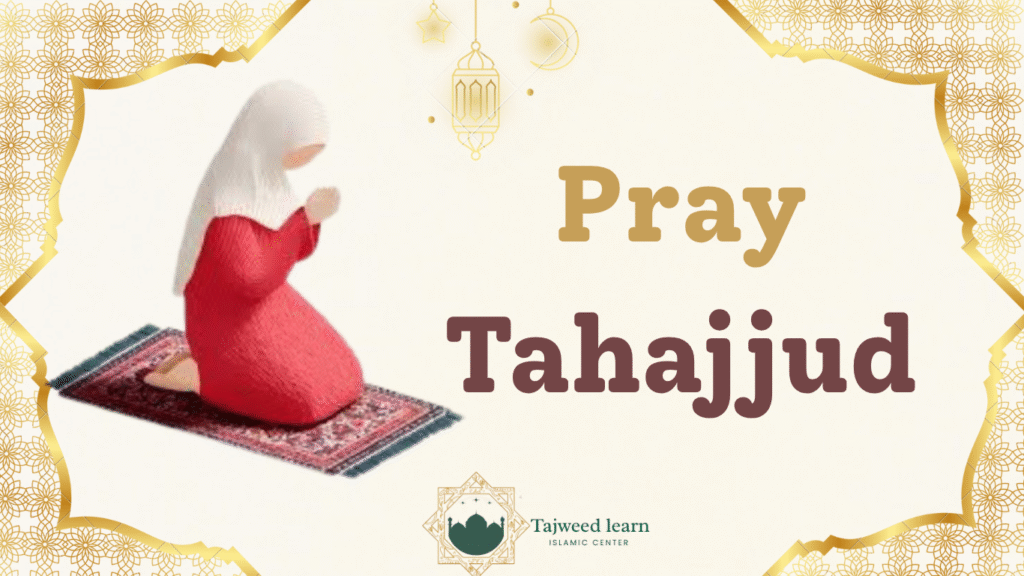What is Tahajjud?
The Tahajjud Salah is one of the most virtuous voluntary prayers in Islam, performed after waking from sleep in the last part of the night. It is a means of attaining Allah’s mercy, forgiveness, and inner peace. Before beginning, a believer makes the tahajjud prayer niyat with pure intention and devotion.
The tahajjud niyat in Arabic is recited to express sincerity toward Allah alone. After completing the prayer, Muslims raise their hands and make heartfelt tahajjud prayer dua, seeking forgiveness, guidance, and blessings.
In these peaceful hours, worldly distractions fade away, and the heart connects deeply with the Creator. Truly, during this time, the doors of mercy and repentance are wide open.
Tahajjud Prayer Dua (Supplication)
After completing Tahajjud, you may offer any personal to Allah. A commonly recited Qur’anic dua is:
In Arabic:
Transliteration:
Meaning (English):
Meaning (Urdu):
How to Start Tahajjud?
- Make the Intention (Niyat)
Decide sincerely to wake up and pray Tahajjud for the sake of Allah. You can say the tahajjud prayer niyat or tahajjud niyat in Arabic silently in your heart. - Wake Up in the Last Part of the Night
Tahajjud is best offered during the last third of the night, just before Fajr, when the night is peaceful and Allah’s mercy is abundant. - Perform Wudu (Ablution)
Ensure you are clean and have performed wudu before starting your prayer. - Start with Two Rak‘ahs
Pray at least two rak‘ahs initially, then increase if you are comfortable. This is how you can how to pray tahajjud at home easily. - Recite Qur’an Thoughtfully
In each rak‘ah, recite verses from the Qur’an slowly and with understanding. - Make Personal Dua (Supplication)
After completing your prayer, make heartfelt tahajjud prayer dua asking Allah for guidance, forgiveness, and mercy. - Be Consistent
Start gradually and be consistent, even if it’s just a few nights a week. Regularity is more rewarded than long prayers done occasionally.

Du’a of the Prophet ﷺ for Tahajjud
Arabic:
Transliteration:
Meaning in English:
Urdu Translation:

Benefits of Tahajjud Prayer:
1. Spiritual Closeness to Allah through Tahajjud Prayer Niyat:
Strengthens your connection with Allah through sincere night worship. By learning how to pray tahajjud at home with the correct tahajjud niyat, your devotion becomes more meaningful.
2. Forgiveness of Sins through Tahajjud Prayer Dua
Tahajjud is a special time when repentance is accepted. Making a heartfelt tahajjud prayer dua after your prayer helps seek Allah’s forgiveness.
3. Inner Peace and Tranquility with Tahajjud Dua for Success
Praying Tahajjud calms the heart and mind, reducing stress. You can also recite a tahajjud dua for success for guidance and comfort in life.
4. Divine Guidance by Performing Tahajjud at Home
Regular Tahajjud provides clarity and direction. Knowing how to pray tahajjud at home ensures consistency and devotion in your night prayers.
5. Mental and Emotional Strength through Tahajjud Prayer Niyat
Night prayers build patience, discipline, and resilience. Starting with the correct tahajjud prayer niyat strengthens both your spiritual and emotional well-being.
How Often Should We Perform Tahajjud?
- Tahajjud is a voluntary (nafl) night prayer.
- It can be performed daily or a few times a week.
- Consistency matters more than quantity.
- Regular prayer strengthens your connection with Allah.
- Even a few sincere rak‘ahs are highly rewarded.
- Make your tahajjud prayer niyat before praying.
- Recite your tahajjud prayer dua for guidance and mercy.

Importance of Tahajjud Prayer:
- Closeness to Allah Through Tahajjud Prayer:Praying Tahajjud, whether at home or elsewhere, strengthens your connection with Allah. Performing how to pray tahajjud at home allows a believer to stand in sincere worship away from worldly distractions
- Forgiveness of Sins Through Tahajjud Prayer Niyat:The night prayer is a blessed time when Allah’s mercy and forgiveness are abundant. Making the tahajjud prayer niyat and sincerely turning to Allah for repentance is highly encouraged and accepted.
- Spiritual Strength and Inner Peace With Tahajjud Niyat:By observing Tahajjud consistently and focusing on your tahajjud niyat, your heart and mind find calmness, reducing stress and anxiety, while also building patience, resilience, and emotional stability.
- Divine Guidance and Tahajjud Prayer Dua:Praying in the quiet of the night gives a believer time to reflect and seek Allah’s guidance. This is also the best moment to make a tahajjud prayer dua for guidance, protection, or personal needs.
- Success and Reward Through Tahajjud Dua for Success:Following the example of the Prophet ﷺ and making heartfelt tahajjud dua for success helps strengthen faith, self-discipline, and mindfulness, while also inviting Allah’s blessings and mercy into your life.

